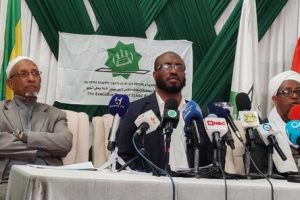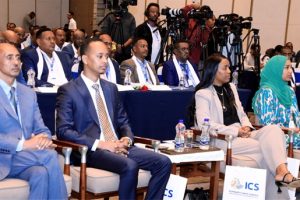
Controversial procedures and unfolding of recent elections held in some African countries could convey invaluable lessons for the nations rolling sleeves to conduct own elections, scholars say. Sources indicate that twenty African countries are expected to conduct general elections in 2019, as Ethiopia is undergoing preparatory works for election 2020. Some of them have already conducted respective election over the course of the past few months despite the fact that their procedures and results have led to controversies and differences between competitors and even election observers.

Noting that compared to other times, some of the recent elections were relatively peaceful, Worku Belachew, President of African Studies Professional Association and Deputy Editor in Chief for The Ethiopian Herald, says there are indicators that African politics is emerging out from uncharted waters and taking a turn for the better. Based on the recent experiences of the Democratic Republic of Congo (DRC), Angola, Kenya and Nigeria, Worku argues that when it comes to election results disagreements or differences may crop up from witnessed short falls during preelection, election and after election.
“There could be intrigues during preelection periods. For instance, election gadgets were reportedly burned in Nigeria and Congo. Whether these incidents had direct link to the elections or they were manifestations of leading parties’ intentions to change election results, they leave doors ajar for controversies,” according to him. During post-election not accepting results, accusing one another and differences on outcomes between competitors and election observers have been common issues affecting the process of building democracy in Africa.
Killing, looting and destruction have been characterizing the aftermaths of African election, notes Worku. Why is this happening? Cultural and economic background of the people has its own role on the issue of African politics. Worku says “Ethnic-based dispositions influence the supposedly democratic election battles in Africa. Ethnicity is mostly myth. Different societies mix with one another due to natural or manmade factors. As a result, there is acculturation and cultural effusion as one embraces the best culture from the other,” Worku believes that a society is like water in a pond.
In the absence of tributaries, the pond could run dry. The one with tributaries gets larger. In this case, African cultures have always been open and places of confluence. However, divisive cultures were adopted after colonialism. Current elections are framed on the bases of ethnic temperaments. Also when it comes to educational backgrounds among citizens a big chasm is apparent. On the other hand, holding elections requires dialogue and resource.
“Wealthy countries do not invest to bring to power an administration that fails to meet their interests. As a result, elections could be manipulated by external forces. This is one factor that results in incompatibilities of African elections,” he stresses. Worku also believes that structural adjustments also matters. “Africans are not new to democracy. But it is mandatory to introduce or bring a democracy that best suits African cultures.”
Pertaining to Ethiopia, he is of the opinion that political parties may organize themselves from the perspective of victim’s mentality or ethnicity. But when it comes to the big national agenda, they could be remiss in leading the country, for they entertain different interests. Instead of ethnic political integration, it is better to rally behind the ideological politics of citizenship. It is better to practice a citizenship-based politics, which is related with the issues of resource or land. If double standard is made a point in elections, it could pose a problem,” adds Worku.
Ethiopia’s current status the life span of political parties is mostly brief as they are so many in numbers. The largeness of the figure may not be a problem by itself, but it could create confusion on voters to identify their best alternatives, according to Worku. `Bruke Tadese Operation Manager at Ethiopian Commercial Bank and who specialized on African Studies for his part argues that African democracy mostly mirrors western ideologies.”
“It is hard to say that western ideologies of democracy are ill fit for Africa. But it is better to shape African democracy from the continent’s perspective,” notes Bruke. According to him, democracy is all about fair election and peaceful power transition. That requires building peoples’ trust on the system. On that case, it is also necessary to create a society that understands and accepts the reality.
There is winning or losing in elections among competitors that one supports or opposes, according to him. Most elections in African countries lead to conflicts because the systems are established without securing trust from the people. The gaps of trust in the system could open doors for the people to label election results as fake or not fifty plus one and also speculate influences by external powers. Bruke argues that democracy demands intellectual society.
When a society is not intellectual, it could be easy to deflect its views for one’s personal end. That is a big problem that surfaces in different African nations during election. Reflecting that there have been significant improvements in some countries like Ghana and South Africa., Bruke says it is the result of efforts towards creating intellectual or alert societies by building trust in the system. Inconveniences capable of triggering ethnic, religious, or linguistics issues are basic institutional problems that create distrust and affect the democratization process, says Bruke.
“If the government of Ethiopia does not throw its full weight behind towards strengthening and refining its democratic institutions like Election Board and Courts, it could be hard to see the good signs of democracy and trust in elections to be conducted down the road,” he underscores. In terms of influences from external forces, Bruke says he thinks it is difficult for African countries to fully prevent external interventions due to economic factors. For instance most institutions in Ethiopia operate with financial assistance from external partners.
As there is still abject poverty and foreign exchange scarcity with low foreign direct investment, it is hard to prevent the influence of external interventions, he adds. Meanwhile, Bruke thinks the best option for countries like Ethiopia is beefing up their bargaining power. “It is also better to study and consider the way how East Asian countries like China succeeded in handling such matters, in the long run,” stresses Bruke.
Professor Merera Gudina, Political Scholar for his part argues that it is better to respect and strike a balance between the ideologies of both ethnic-based and citizenship-based federalism in Ethiopia. Given the current reality one cannot simply erase ethnic-based federalism with a proclamation. A smooth process may take twenty or more years. Therefore, Ethiopia’s lesson from recent African elections could be changing the nature of the political game and stressing on maintaining balance between ethnic-based and citizenship-based political ideologies, says Merrera.
The Ethiopian Herald Sunday Edition May 26/2019
BY HENOK TIBEBU





